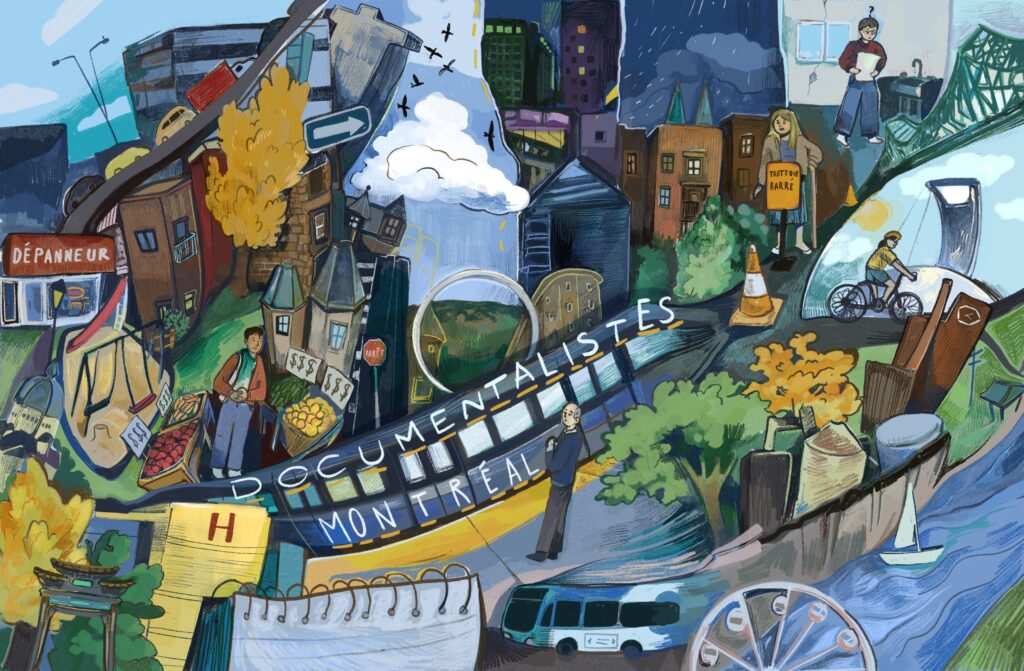
Montreal, October 1, 2025 – Documenters Canada launches its Montreal branch today with the publication of notes from our newly-trained community members, in partnership with the news outlet Pivot.
The goal? Training citizens to document public meetings. From borough councils to standing committees, Documenters will keep a close eye on these gatherings where elected officials decide on the future of Montreal. They will share notes containing relevant, accessible and factual information, working hand in hand with professional journalists who will fact-check the content.
Everything will be published on Pivot’s website and on the “Montreal” page of the Documenters Canada site. Our field guide is the foundation of our approach, and additional resources are available there as well.
In Montreal, community training began with four long-time contributors to L’Itinéraire magazine. After completing the training, they went together to document the Ville-Marie borough council on September 9 and the municipal election debate on September 16 at l’Institut du Nouveau Monde.
For Agathe Melançon, from L’Itinéraire, this experience makes it possible to “see how politicians think and how a borough council or a debate unfolds.” She aspires for the notes to “get to the heart of key issues and citizen concerns, and include the responses of politicians and officials,” providing a tool to “understand the world we live in and how we can get involved, come together around a cause.”
For Gabriel Lavoie, also from L’Itinéraire, the experience opens up new perspectives: “Many people will be informed about what’s going on, and it might even help me grow in my profession.”
Training continued with youth from the Mercier-Est neighbourhood in partnership with Solidarité Mercier-Est, and more are planned, including in the Faubourg Saint-Laurent neighbourhood with the Table de concertation du Faubourg Saint-Laurent.
Why now?
The 108 local news organizations that have closed in Quebec since 2008 and the recurring cuts in newsrooms are a reminder: local information is more under pressure than ever. Trust in media is also at its lowest, with nearly one Quebecer in two believing it is certain or likely that traditional media manipulate information.
In the face of these crises, involving community members is a lever to rebuild damaged trust by co-producing relevant information rooted in local realities.
Documenters Canada thus supports the transformation of the media’s role, which, in addition to its essential mission of watchdogs of democracy, also commits to equipping citizens to take an active part in democratic life.
Documenters’ notes, which aim to become a new civic information archive, are reusable under the Creative Commons licence and therefore represent a new tool for any journalist wishing to enrich their reporting.
Engaged partners
The expansion of Documenters Canada would not have been possible without the commitment of Pivot, Concordia University and community partners, in particular L’Itinéraire, the Table de concertation du Faubourg Saint-Laurent and Solidarité Mercier-Est.
We thank the Neighbourhood Round Tables Coalition and its activities coordinator, Joakim Lemieux, who have been supporting the development of this initiative for many months.
We were also able to count on the support of the Documenters / Documentalistes Canada network, including our colleagues in Toronto, Alberta and Nova Scotia, who are working on the development of their respective sites and the strengthening of the common network, as well as Max Resnik, Director of Growth at Documenters.org in the United States.
Finally, we thank the Inspirit Foundation, whose funding made it possible to launch the Montreal site, as well as the Social Sciences and Humanities Research Council of Canada, which has renewed and expanded its support for Documenters Canada.
Want to learn more? Have a question? Collaborate? documenters-canada@concordia.ca
About Documenters Canada:
Documenters Canada’s mission is to equip people to engage in their community in new ways while also improving the amount and quality of local news and information, and working toward greater accountability of elected representatives. We do this by training and paying community members to document public meetings in partnership with news and community organizations. Through its research stream, Documenters Canada adds to a growing body of literature that has already shown that notes produced by Documenters are often easier to access than official minutes and can help foster greater civic participation.